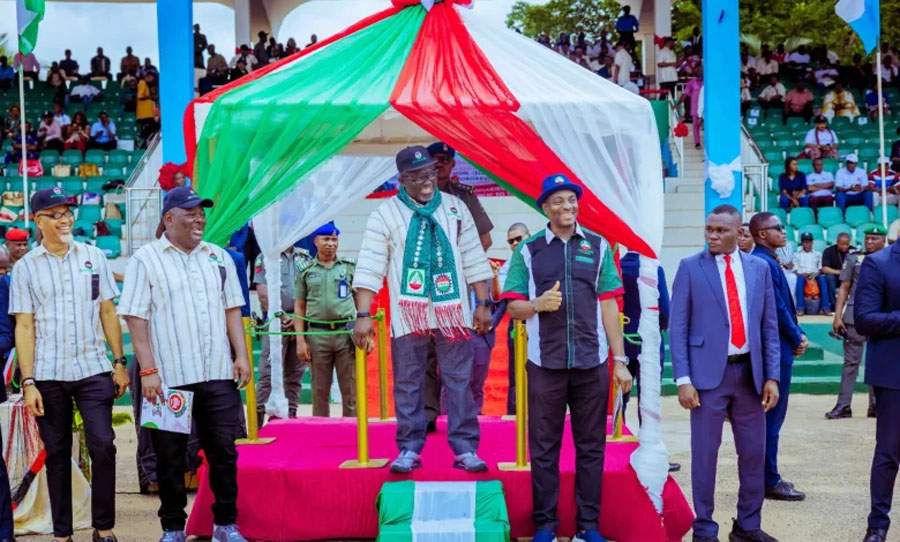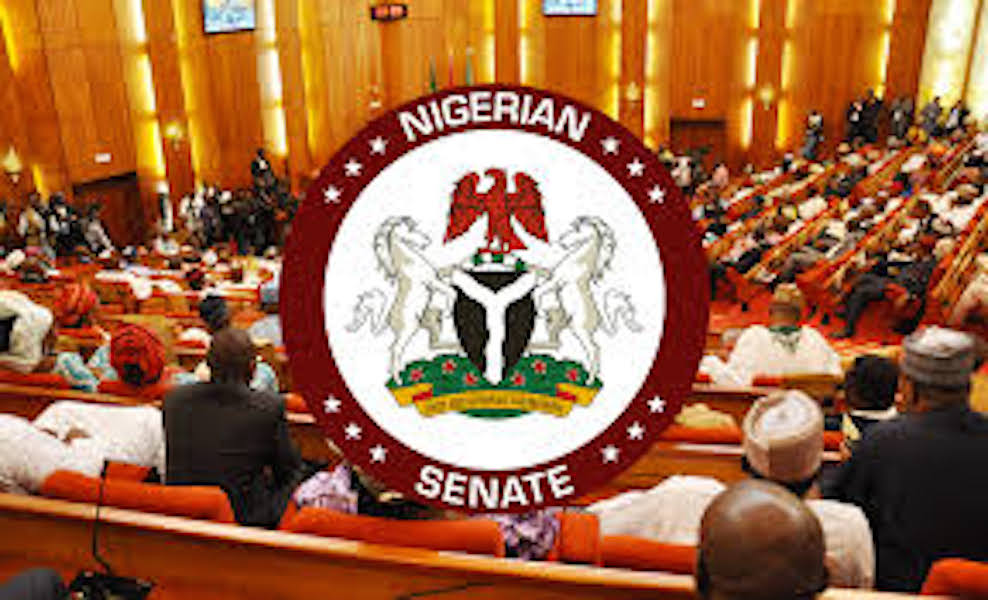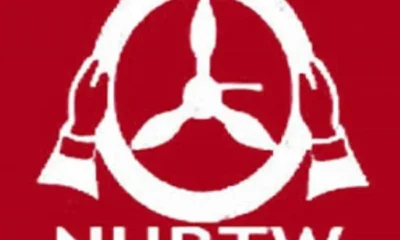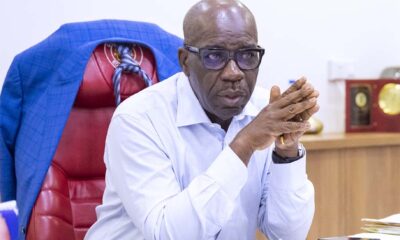News
North central zone stakeholders propose 35% revenue allocation to states

- Want FG to have 39%, LGs 26%
Majority of the states in the North central zone have proposed a 39: 35: 26 per cent revenue sharing formula for the federal, state and local governments respectively.
The states made their positions known at a one-day North Central Zonal public hearing on the review of the current Revenue Allocation Formula (RAF), organised on Thursday by the Revenue Mobilization Allocation and Fiscal Commission (RMAFC), at Government House, Lokoja.
In his remarks, Gov. Yahaya Bello of Kogi, advocated a sharing formula of 39, 35 and 26 per cent between the Federal, States and Local Governments, respectively, in order to effect the desired development of the country.
Bello, who was represented by his Deputy, Edward Onoja, stated that the main objectives of revenue allocation was to promote national unity and accelerate the economic growth of all tiers of government.
He lamented that the current formula in use had failed to achieve the desired aspirations of the citizens for development.
“We can no longer deny that a comprehensive review of RAF currently in use in Nigeria had become overdue.
”Currently, the Federal Government takes 52.68 per cent, the 36 states and the FCT split 26.72 percent and the local government councils make do with 20.60 per cent.
“The nine oil producing states receive an additional 13 per cent as derivation revenue which is distributed among them depending on the actual contribution of each to crude oil receipts.
“Existential realities between the three tiers of government today necessitate a more equitable sharing plan for all revenues accruing into the federation account,” Bello said.
He, therefore, urged the review committee to take a critical look at the revenue allocation formula currently in use with a view to do the needful in the interest of Nigerians.
The News Agency of Nigeria (NAN) reports that the representative of Plateau state proposed a 40, 35 and 25 per cent formula, while Nasarawa state advocated 44, 35 and 21 for the three tiers of government, respectively.
Also speaking, the Commissioner for Land, Survey and Solid Minerals, Mr Bernard Unenge, who made the presentation on behalf of the Benue state government, advocated 30, 45, and 25 per cent for federal, states and local governments, respectively.
On her part, the Kwara State Commissioner for Finance, Mrs Florence Oyeyemi, in a virtual presentation, advocated a 33, 30 and 27 per cent sharing formula, respectively.
Dr Joel Akowe, on behalf of the Academia, proposed 30, 35 and 20 per cent respectively, while proposing a 15 per cent allocation to a Special Fund.
The Representative of the Network of Kogi state Non Governmental Organisations (KONGONET), Mr Muraina Idris, proposed 40, 27 and 33 per cent respectively, as he argued that this formula would enable the federating units and constituents to receive more attention in terms of development.
He added that over the years, the state governments had not really shown the need for increased resources as the community of civil society feels that a huge gap had existed between resource allocation and development, across majority of the federating units.
Idris further said that their proposed allocation of 33 per cent to local governments, would reduce rural-urban migration, create employment, promote development in rural areas and improve security.
For the Vice President, National Council of Women Societies (NCWS), Kogi branch, representing women, the three tiers of government should receive allocations in the ratio of 30, 34 and 23 respectively, but that the 13 per cent derivation for oil producing states be retained.
Mr Victor Ibrahim, who spoke on behalf of the Kogi Chamber of Commerce, Industry, Mines, and Agriculture (KOCCIMA), proposed 36, 33 and 26 per cent revenue formula, but on the condition Nigeria would practice true federalism.
Ibrahim said this had become necessary because the nation had been engaged in a unitary system of government, which had hindered development at the grassroots.
Mr Yahaya Ibrahim, the National Chairman, Persons Leaving With Disabilities (PLWDs), proposed 39, 29 and 32 per cent for the three tiers of government, respectively.
He specifically appealed to the Federal Government to however support the Kogi government, in its bid to empower the PLWD in the state.
The chairman cited Gov. Yahaya Bello for commendation, for according PLWDs in the state priority in terms of inclusiveness in governance, empowerment, among others.
Earlier, in his address of welcome, the Chairman of RMAFC, Elias Mbam, said the commission had been empowered by the Constitution to review, from time to time, the RAF and principles in operation to ensure conformity with changing realities.
This was by virtue of Paragraph 32(b), Part 1 of the Third Schedule to the 1999 Constitution of the Federal Republic of Nigeria (As Amended), he said.
The chairman disclosed that for the review, additional relevant data had been collected from relevant government agencies, and studies on fiscal matters relating to revenue allocation had also been undertaken.
He said that the public hearing was the fourth in the series, as the commission had earlier undertaken similar exercises in the South-West, South-South and South-East Zones.
Mban said plans had also been concluded to conduct the hearing in the remaining two geo-political zones of the North-West and North-East.
He said, “I wish to use this opportunity to invite all Nigerians to please participate and make contributions to this review process.
“It is our belief that your contributions will certainty enrich the process and ensure that the new revenue allocation formula reflects the wishes and aspirations of Nigerians.”
News
Drama as Delta workers boo Gov Oborevwori over minimum wage

Drama as Delta workers boo Gov Oborevwori over minimum wage
Delta State workers expressed their disappointment with Governor Sheriff Oborevwori on Wednesday as he failed to address the issue of minimum wage during the 2024 May Day celebration in Asaba, themed “People First.”
Anticipating news on the minimum wage, the workers were disheartened when the Governor concluded his speech without mentioning it, prompting them to chant, “no, no, no, we no gree, pay us our minimum wage.”
Despite the interruption, Oborevwori stood firm, stating, “Listen to me, listen to me, calm down, calm down, you cannot cajole me.”
The celebration, which included a march past by various affiliate unions, turned sour due to the workers’ dissatisfaction with the governor’s silence on the wage issue.
READ ALSO:
- Neighbour, son beat mother of four to death in Edo
- London sword attack leaves British-Nigerian teenager dead
- Lagos uncovers 86 rooms under Ikoyi bridge where tenants pay N250,000 rent
According to a union leader, previous attempts to address the matter with the Governor proved futile.
In response, Governor Oborevwori announced plans to establish a committee to address the workers’ demand for salary increases amidst prevailing economic challenges. He praised the workers for their support and assured them of his administration’s commitment to workers’ welfare.
“I have listened attentively to your requests, and I have taken note of them; they are, no doubt, legitimate demands and as a responsible government, I will deliberate with my team on how best to address them within the limits of the resources available to us,” he affirmed.
In a statement delivered by Comrade Goodluck Ofobruku, the State Chairman of the Nigeria Labour Congress, NLC, he emphasized the importance of politicians keeping their promises, stating, “We want promise keeper politicians because, as workers, we keep records of promises.”
Drama as Delta workers boo Gov Oborevwori over minimum wage
News
Two million bank accounts closed over BVN, NIN, others

Two million bank accounts closed over BVN, NIN, others
Commercial banks in Nigeria closed 2.021 million bank accounts in the first quarter of 2024, Q1’24, to clean their books of questionable accounts and comply with regulatory orders on the linkage of bank accounts to the National Identity Number, NIN.
This is contained in a report by the Nigerian Interbank Settlement System, NIBSS, which also indicated that the number of inactive bank accounts grew month-on-month, MoM, by four million or 2.0 per cent to 19.7 million in March 2024 from 19.3 million in the previous month, February.
A bank account is classified inactive when it records zero transactions including deposits, withdrawals, transfers or point-of-sale transactions for six months.
READ ALSO:
- Senate insists on 16 years as requirement for tertiary institution admission in Nigeria
- Minimum wage: Labour threatens nationwide strike by end of May
- UCL: Füllkrug gives Dortmund 1-0 first-leg win over PSG
However, details of the “Industry Bank Account Database”, a monthly data reported by banks, and compiled by the Nigerian Interbank Settlement System, NIBSS, also indicated that the number of active bank accounts grew by 6.62 million or 3.0 per cent to 219.64 million from 213.02 million in February.
Recall that in December 2023, the CBN issued a directive to all commercial banks in the country to restrict tier-1 accounts without proper Biometric Verification Number, BVN, and National Identity Number, NIN, that are not linked by Thursday, March 1st, 2024.
According to NIBSS data on BVN enrollment count, 61.6 million Nigerians have BVN as of April 2024.
Two million bank accounts closed over BVN, NIN, others
News
Senate insists on 16 years as requirement for tertiary institution admission in Nigeria

Senate insists on 16 years as requirement for tertiary institution admission in Nigeria
The Nigerian Senate has moved to clarify recent discussions regarding the minimum age requirement for admission into tertiary institutions.
The red chamber assured Nigerians that the current age requirement of 16 years has not been altered and that recent comments suggesting an increase to 18 years were personal opinions.
READ ALSO:
- Minimum wage: Labour threatens nationwide strike by end of May
- UCL: Füllkrug gives Dortmund 1-0 first-leg win over PSG
- Adopt quarterly exchange rate for Customs duty, economist advises FG
Chairman of the Senate Committee on Media and Public Affairs, Adeyemi Adaramodu, emphasised that any changes to the age requirement would require legislative action following due process.
Adaramodu explained in an interview with journalists that comments made by the Minister of Education, Prof. Tahir Mamman, about increasing the minimum age limit were not legally binding but rather personal opinions.
The Minister of Education had previously hinted at plans to review and raise the minimum age for admission into tertiary institutions to 18 years.
Senate insists on 16 years as requirement for tertiary institution admission in Nigeria
-

 metro2 days ago
metro2 days agoLabour Day: Nigerian workers are dedicated, resilient, says NURTW leader
-

 Education3 days ago
Education3 days agoBREAKING: JAMB releases 2024 UTME results
-

 Auto19 hours ago
Auto19 hours agoAppeal court takes over NURTW case as NIC withdraws
-

 metro4 hours ago
metro4 hours agoSecurity forces, vigilantes arrest kidnapper terrorising communities in Kogi
-

 metro2 days ago
metro2 days agoWoman arrested in Ogun after husband commits suicide
-

 Sports3 days ago
Sports3 days agoFinidi George appointed Super Eagles head coach
-

 News3 days ago
News3 days agoSeun Kuti retracts allegation on P&ID fraud, tenders apology
-

 Uncategorized3 days ago
Uncategorized3 days agoJust in: Edo govt announces N70,000 minimum wage for workers starting May 1









